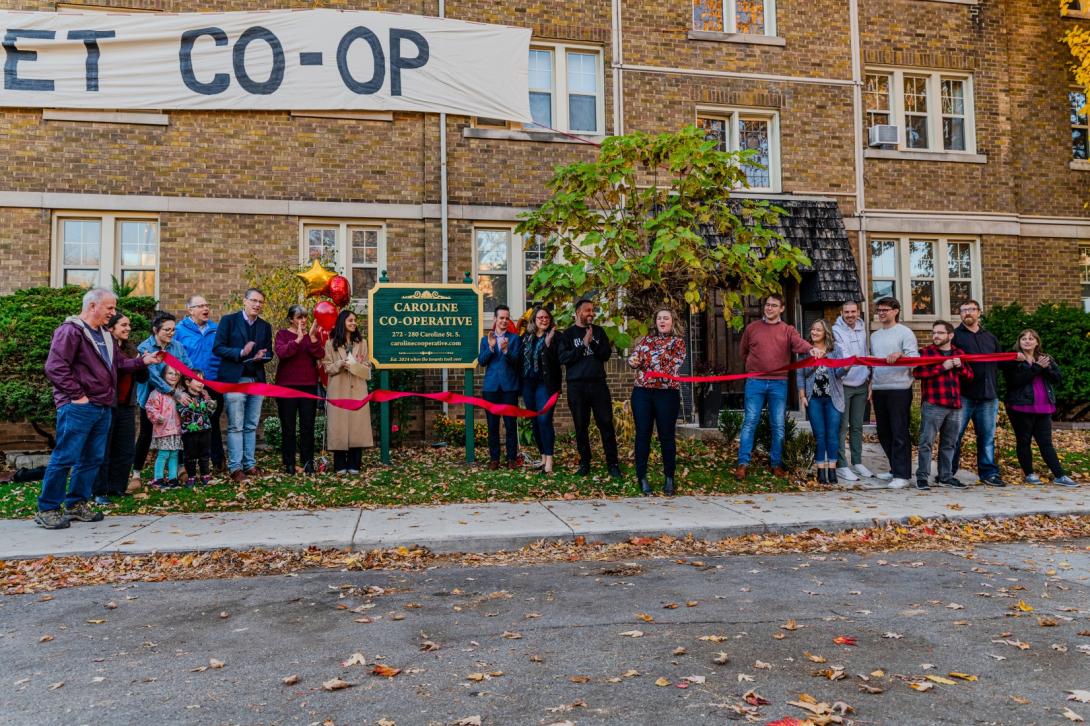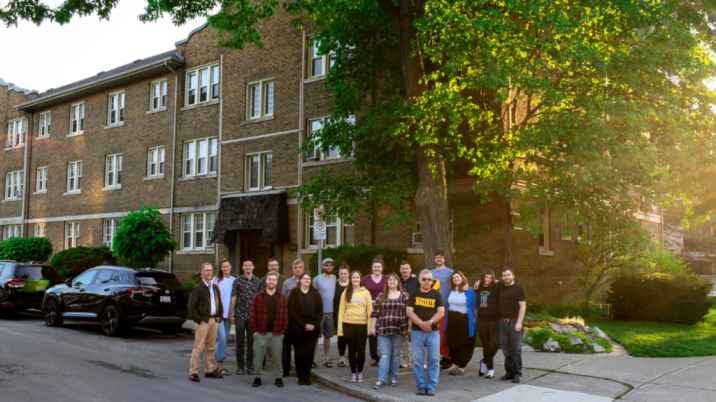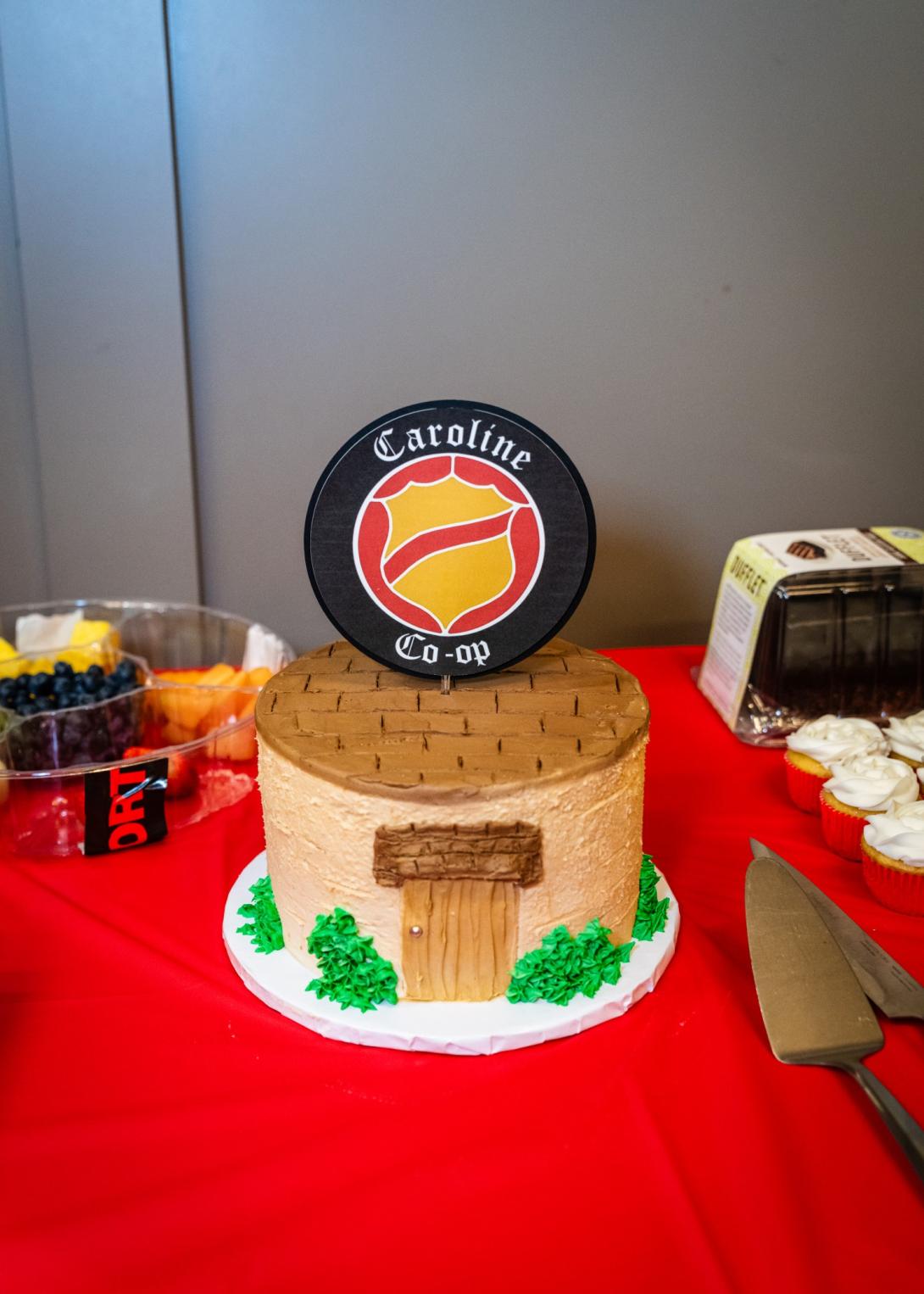
Originally published by The Media Co-op
Emily Power was living in her apartment at 272 Caroline Street in Hamilton for less than a year when the owner put the 21-unit building up for sale.
The sale took many residents by surprise. Even the superintendent didn’t receive a notice from the owner.
Power braced for the worst. She was wary that an investment company would purchase the building and raise rents, either through Cash-for-Keys offers, where landlords offer cash for tenants to vacate the rental unit, or another type of pressure or harassment, since many residents were longstanding, rent-controlled tenants.
Power, a born-and-raised Hamiltonian, was friendly with a number of tenants in her building, so she began organizing and eventually started a tenant association at 272 Caroline. There are no legal limitations in Ontario to starting a tenant association and no limit to the number of participants required. After a big turnout at the first meeting, the association quickly mobilized to fight the sale.
They researched prospective buyers and wrote letters to companies touring the building, letting them know that 272 Caroline had an active tenant association. They learned their rights as tenants and prepared for various tactics a new landlord might use to push them out of their homes.
“Many of us — friends and family, co-workers — have gone through these renoviction situations,” Power says. “People were motivated to support each other and fight back.”
Buying out the building
After two months of meeting regularly, they began floating the idea of buying the building themselves and starting a housing cooperative. A housing co-op is a type of non-profit housing that removes the landlord from the equation. Any revenues made from rents are used for operating expenses — mortgage payments, property taxes, repairs and the like. Any leftover profit goes into building investments and capital reserves.

Power reached out to their local Cooperative Housing Federation (CHF) branch to see if there was any precedent of another tenant association fundraising for a down payment and getting their own mortgage. The CHF representative said that there weren’t many examples of residents buying out their building to start a co-op. Power also learned that there were no dedicated funding programs to support new cooperatives. But the federation was supportive of the idea.
Power informed the tenants of what might be needed to start their own co-op. The association took a vote and decided to move ahead with trying to purchase the building. But buying a 21-unit building is more challenging than buying a condo or even a single-family home. The owner told them that there were a number of big real estate companies looking to buy the building, so the tenant association had to fight against other buyers as well. For big real estate investors, acquiring existing buildings is typically faster and cheaper to grow a portfolio than building new.
“These real estate investment trusts — private equity companies — have so much money they can act quickly," Power says. “They can offer cash to buy a building without conditions. [As] Non profit organizations, we’re really at a disadvantage.”
As there was no real roadmap on how to start their own co-op, Power and the other tenants looked to multiple sources of support. The local Golden Horseshoe Co-operative Housing Federation connected them with city staff and advocated for support to subsidize their down payment. The Hamilton-based Federation crafted a management plan to help the tenants pay for the mortgage and the required building upgrades, and even donated some money to cover the final closing sale costs. They also connected the Caroline Co-op with other co-ops in Hamilton.
“We had a lot of questions about, how does a co-op actually work?” Power says. “How do you share responsibilities for maintenance, governance and finance?”
The board worked closely with Hamilton-based First Ontario Credit Union, which helped the board apply for a Canada Mortgage Housing Corporation (CMHC) special loan.
“First Ontario reps worked really hard to advocate for us with CMHC to help them understand ‘What is a co-op?’ Yes, this is affordable rental housing. Yes, the overall financial model is viable,” Power says.
CMHC special loans offer $100,000 support for the mortgage down payment to provide incentives for non-market housing investment. It’s based on three main criteria: accessibility, affordability and sustainability. Depending on how high a building scores, CMHC will offer longer mortgage amortization periods and favourable interest rates. Since the Caroline Co-op was offering below-market rent for all of the tenants in the building, it had the option to choose a 50-year mortgage with low interest. Having this flexibility was the reason why First Ontario Credit was willing to invest.
“From what I gather, it's actually very rare that people apply [for the CMHC special loan] under the affordability stream,” Power says. “It seems like a lot of larger landlords are benefiting from this federal program for energy efficiency and accessibility without actually guaranteeing that critical affordability piece.”

The newly formed tenant association cobbled together low interest loans and donations from various community foundations and private individuals, which took about a year of effort and networking. According to Power, there were a number of investment companies “waiting in the wings” for the tenant association’s agreement to fall through. But after a public demonstration on the front lawn of the building scared other investors away, they were finally able to close on a $4,800,000 sale price with the owner.
The Caroline Co-op proved that for credit unions, investing in non-market housing can be a good financial investment. First Ontario Credit Union said that they would be interested in working on other co-op conversions.
“People should know that they can do this too,” Power says.
Untapped Potential
Housing cooperatives present a huge potential to the housing stock, not just in Hamilton but across Canada. Co-ops are a popular form of housing all across the world. In some countries cooperative housing makes up over 40 per cent of all housing stock. In Canada, it’s less than one per cent. The Durand neighbourhood, where the Caroline Co-op is, comprises nearly 80 per cent rental units, so there is a lot of opportunity for other buildings to do the same as the Caroline Co-op.
Canada has an aging population, and for many on fixed incomes, a stable rent and a sense of community are really important. Cooperative housing has shown that rents can be reduced, repairs can be made quickly, and tenants can have freedom from landlords and still live happily.
“Some co-ops that were built in the ‘60s and ‘70s are now coming to the end of their mortgage, or they paid off their mortgage," Power says. “So they're in a wonderful position where they can actually lower their housing charges for their members, because they're able to save a huge amount every year.”
“It's really about maintaining affordability for the members of the co-op.”
More could be done through all levels of government to fund non-market housing. The city of Hamilton started investing in policies directly supporting non-profit housing. The city’s new Housing Accelerator Fund will provide incentives to non-profits and co-ops, which could pave the way for other groups to replicate the Caroline Co-op success. And last year, the federal government made a $1.5 billion commitment to support non-market housing — the largest federal investment to build co-op housing in 30 years. The program will run until 2028 and will consist of around $500 million in contributions and $1 billion in loans.
However there are specific parameters for this funding. For a new co-op to be eligible to receive funding in a city with a population over 100,000 people, the project must include a minimum of 75 units. So smaller co-ops like Caroline Co-op would be ineligible to receive any support from this federal program.
Organization is Key
No resident at the Caroline Co-op owns their unit. Rather, every tenant is a member of the co-op, which gives them the right to live in a unit and participate in the governance of the building. Every member has equal say in the operations of the co-op (one member, one vote).
While some co-ops require participation — where a lack of participation can lead to termination of membership and eviction — Caroline Co-op has taken a different approach. Members are asked to attend quarterly General Membership meetings and contribute at least two hours per month to the operations of the co-op, but Power understands that there may be barriers to participation.
There is a volunteer board of directors and various committees, which members are encouraged to participate in. When a resident moves out, they simply leave and the co-op re-allocates the unit to the next household on the waiting list.
Power says apart from a water main breaking on their first day of possession, owning the building has been pretty smooth sailing.
“This has been the fun part; coming up with our repair plan and fixing things in people's units that they had been asking for for years under the previous landlord," Power says. “It's empowering for people who live in the building to actually see the results and see how quickly we can get things done when we actually have control ourselves and have the budget to do so.”
As older rental stock starts coming in the market, tenants can be ready to act. Organizing can help not only prepare for any building sale, but in the event of nefarious landlord practices, organized resident groups can also equip tenants to advocate for better landlord practices. It’s important for tenants to use the tools at their disposal. Residents are better off when they’re organized and meet regularly in a formal or informal setting.
Power and the entire co-op plan to release a short documentary to share their learning with others.
“As working-class people, we should be organized,” Power says. “If you're a tenant, you should be reaching out to your neighbours. If you live in an apartment building, try to set up a tenant association in your building… If we're organized, we're better prepared for whatever may come.”

Add new comment